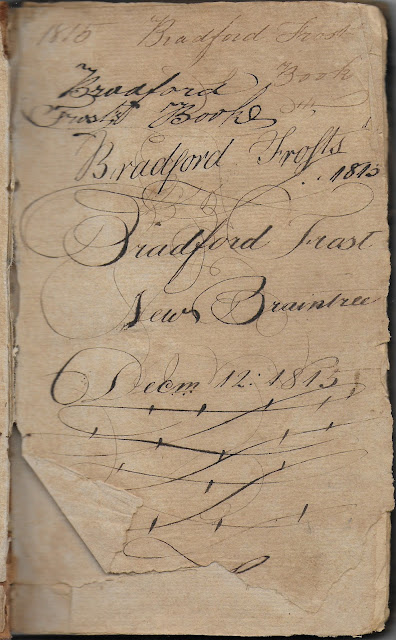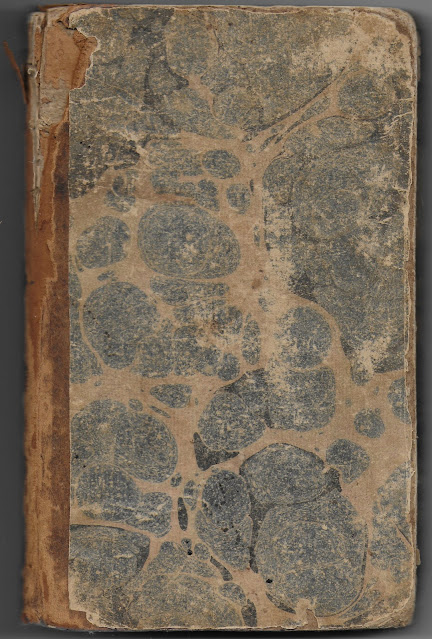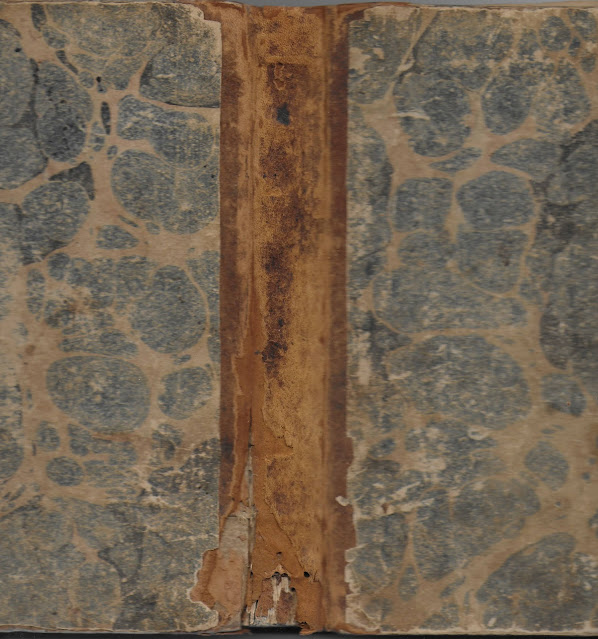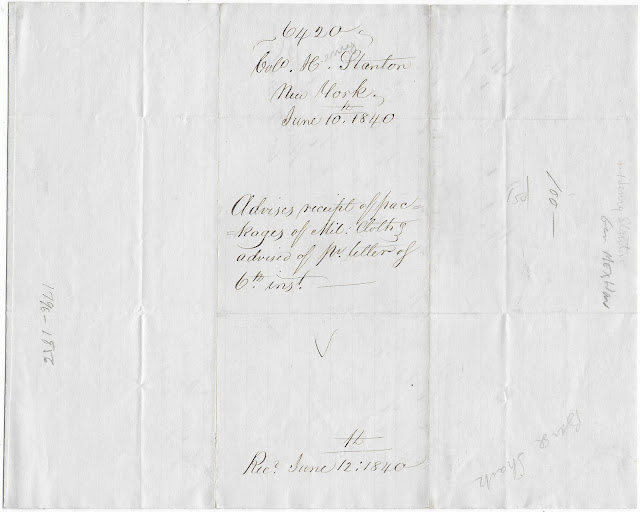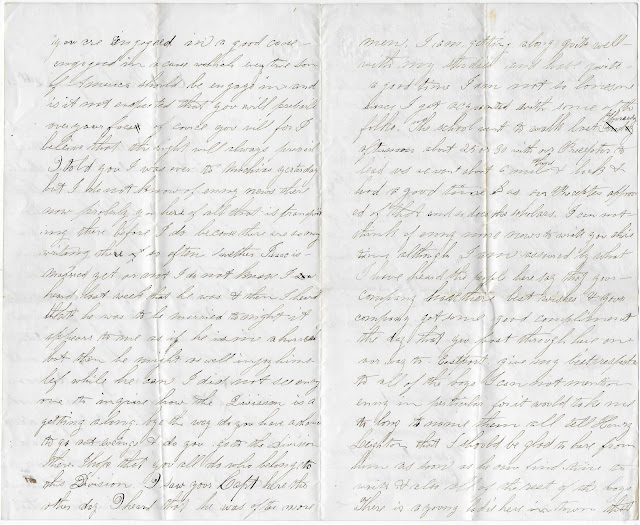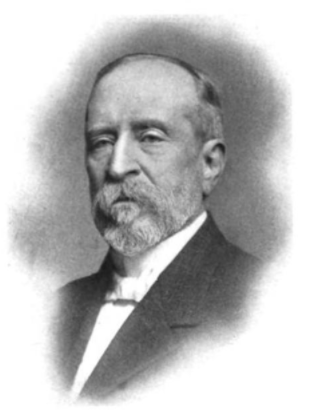Researching the Genealogy and Family History of Orphan Heirlooms
Search our archive for Bibles, autograph albums, IDed photos, documents, correspondence, and other treasures from the past that may relate to your family or area. This project is ongoing, so please visit often.
Many items are available for purchase - Inquiries to heirlooms(dot)reunited(at)gmail.com
Wednesday, December 29, 2021
Tintype of Two Young Men, Jim R?, possibly Rackliff, and Roscoe H?, possibly Hall; possibly Thorndike, Maine
c1870 Newspaper Clipping: General Butler Speaking Against The Salem Gazette; Salem, Massachusetts
 Circa 1870 newspaper clipping pasted into a ledger turned scrapbook, wherein Gen. Butler derides the Salem Gazette newspaper and its editor, presumably then Caleb Foote (1803-1894).
Circa 1870 newspaper clipping pasted into a ledger turned scrapbook, wherein Gen. Butler derides the Salem Gazette newspaper and its editor, presumably then Caleb Foote (1803-1894).Tuesday, December 28, 2021
1812 Mathematics Book that Belonged to Bradford Frost (1800-1866) of New Braintree, Massachusetts
From brief online research, hopefully correct - corrections and additions requested:
Westbrook Seminary, Class of 1900, Mimeographed Copy of Class Prophecy by Richard E. Harvey
 Mimeographed copy of the Class Prophecy for the Male Graduates in the Class of 1900 at Westbrook Seminary, which exists today in Portland, Maine, as a campus of the University of New England.
Mimeographed copy of the Class Prophecy for the Male Graduates in the Class of 1900 at Westbrook Seminary, which exists today in Portland, Maine, as a campus of the University of New England. See another post that features the 1900 Commencement Issue of Westbrook Seminary, which includes this Prophecy, as well as one written for the Female graduates.
See another post that features the 1900 Commencement Issue of Westbrook Seminary, which includes this Prophecy, as well as one written for the Female graduates.
 R. E. Harvey, author Richard Eric Harvey (1879-1968)
R. E. Harvey, author Richard Eric Harvey (1879-1968)Class Prophecies - By Richard E. Harvey
Time, - September, 1900. Place, Portland, Maine
While waiting for the Boston train to be made up, I strolled through the station, picturing in my mind the many beautiful scenes that I was to behold during my journey through the West. On passing the reading room my attention was drawn to a scholarly looking gentleman reading a newspaper. Thinking I had seen him before, I approached and found my old friend "Spud" Palmer. I was somewhat surprised on learning that he was no longer a minister, but was at the time Supt. of an Old Ladies Home in Springfield, Mass., but the loud voice of a crier announced the departure of my train, so I bade him good-bye.
After enjoying a pleasant trip on the cars, I arrived in due time in Boston. Hurrying through the busy station for the purpose of getting an early car up town, my bag struck a chappie dressed in the height of fashion. His demeanor and carriage impressed me vividly. In an instant I recognized Both, another member of the 1900 class. Returning, I apologized for the slight mishap and enjoyed a long talk with him. At his proposal to take a walk, we started off and eventually reached Howard Street. A short distance down this thorough-fare we stopped before a brilliantly lighted hall, where a fellow was calling out to the passer-by to enter and see the wonders he had on exhibition. The chap seemed so well up in his calling that we went in out of mere curiosity. We were not long seated, when Both turning to me explained, “Why, old boy, don't you recognize that fellow?” and on answering in the negative he said, “That is ‘Reddy’ Wilson”. And sure enough it was the all-round stage-carpenter and theatrical manager. It appeared that Wilson tiring of the clergyman's work, had entered the show business to which, I am sure, he is certainly adapted. During the performance it dawned upon me that Both had not revealed what he was doing. Upon asking him, he smiled and replied: “Well, Dick, the fact is I am doing nothing but acting in the role of a ‘man ‘bout town’”.
He went on and told me how, by the death of a distant relative, a fortune was left him so that he could live the life of which he dreamed, while sleeping in Roberts’s room those fine, spring afternoons. After leaving the theatre, we started for my hotel, arriving there at six in the evening. I left him here, and went to my room to plan for my long journey of the morrow.
Having had a good night's rest, I arose early in the morning and boarded a car for the Union Station, from which place I departed for Salt Lake City. Three days I spent in travelling and arrived there the fifth day of September. While wandering one beautiful morning through the streets, I noticed on one of the most fashionable avenues, a stately mansion. Seated at one of the windows was a middle-aged man whom I recognized as my old friend and president of the class, Leighton. Time had wrought some changes, but his side-curls seemed to be as finely trained as ever. I at once mounted the stairs and rang the bell; a servant answered my summons, and I was ushered to the presence of my classmate. A cordial greeting followed a hearty handshake, and I was not surprised when he informed me that he had become a Mormon, for I knew we always was an admirer of the fair sex. He, moving about in the best society, and being a lawyer of great renown, had taken unto himself fourteen wives. When asked if I would like to meet some of his help-meets, I, of course, accepted his invitation, and he lead me to a handsome private parlor. There, reposing on couches, were the most beautiful women my eyes had ever feasted on. We next went to the smoking-room and while enjoying some cigars, talked over old college days. He told me that “Cut” Cutten had a flourishing Baptist Parish in Los Angeles Cal., and that the minister was in the best of health. Dinner having been served, my bade my friend farewell, as it was necessary for me to leave Salt Lake City that afternoon.
When I had visited several of the larger cities, St Louis, Chicago and others, I returned east to New York. I arrived in this great metropolis early in the afternoon and having no friends there, decided to go to the Broadway Theatre, where the “Rivals” was being played. On looking over the cast, I was startled to find that “Jim” Sennett took the part of Sir Lucius O’Tregger and another college chum, Doble filled the role as Faulkland. I enjoyed the production and to say that O’Tregger and Faulkland did well would be putting it mildly. I met both after the performance and took luncheon with them. During our conversation they informed me that Wescott had a lucrative position in a ribbon store in Caribou, Me. I left them at a late hour and went to the Holland House for the remainder of the night. I was aroused from my heavy slumbers at six in the morning to take my train for Providence.
Having arrived at Providence at 10 in the forenoon, I made plans to visit some friends at Brown University, and while strolling along towards my destination, I noticed a poster which read as follows:
To-night
At Goddard Hall,
Lecture on expansion,
by
Witham.
Being interested in the subject which the lecturer had chosen, I made arrangements to hear him in the evening. I arrived at the hall that night and took a seat in the rear. Shortly after eight o’clock the speaker and others came upon the stage, and to my surprise the lecturer was none other than my former class-mate Witham. I listened to his wonderful oratory, and was amazed at his eloquence. “Withie” is no doubt a born speaker, as was made clear to me at the class meetings and debates while we were at school.
Not wishing to remain longer in Providence, I left for Boston on the midnight train
It was in this city of classical people that I met “Stubby" Watson. During my conversation with him he informed me that he was president of a co-educational school in Columbia Falls, Me. He passed me one of the catalogues and I found that the rules of his school place no restriction upon the students about going off in couples or smoking when and where they pleased. Just like “Stubby”. The catalog contained the names of ten students; but he gave me to understand that the institution was growing all the time. Speaking of our old chum, “Willie Frye” White, he tells me that “Bill” is carrying on a quiet little business in North Anson, Maine, that he has joined the church, and is trying to earn money according to the principles of political economy
After a delightful trip I returned to Portland, glad to have met so many of my former classmates, for in their welfare I shall always be deeply interested.
R E. Harvey
Published “The Messenger”
Commencement 1900
Westbrook Seminary
Monday, December 27, 2021
1840 Letter from Col. Henry Stanton (1779-1856), then Asst. Quartermaster General, in New York City; to Capt. James Ramsey Irwin (1800-1847) in Philadelphia
6420
Col. Henry StantonNew York
June 10, 1840
Advises receipt of packages of Mil. Clothing advised of per letter of 6th inst.
Recd. June 12, 1840
Colonel Henry Stanton (1179-1856), a Vermont native, son of David Stanton and Olivia (Galusha) Stanton, participated in the Seminole Wars and the Mexican War; he was promoted in 1847 to Brigadier General during the War with Mexico.
1838 South Berwick, Maine, Document: Joseph Doe, Esq; Dr. Charles Trafton
Joseph Doe, Esquire - several possibilities in York County, Maine, and across the border into New Hampshire
Dr. Charles Trafton - presumably Dr. Charles T. Trafton (1787-1855)
If you have information to share on either of these men, please leave a comment for the benefit of other researchers.
Undated Letter from Frederick G. Payne, Clarinetist with Maine Symphony Orchestra to Miss Vinal, a Singer from Vinalhaven, Maine
If you have a theory as to the identity of Miss Vinal, presumably from Vinalhaven, Maine, please leave a comment for the benefit of other researchers.
Vintage Photograph Album from the Calais, Maine Area
- top left photo of the near page below appears to be a walking trail along the water
- right photo in the bottom page shows a woman with a house in the background, perhaps downstream past the mouth of the St. Croix River into Passamaquoddy Bay.
Sunday, December 26, 2021
1841 Phillips, Maine, Promise to Pay: by Charles Peas to ? Bonney: names of Gammon & Albert

- Charles Peas - perhaps Charles Pease (1791-1879)
- A. H. Bonney - perhaps Andrew Hart Bonney (1808-1900)
- Gammon
- Albert
Friday, December 24, 2021
1861 Letter from Lewis W. Campbell, Student at Washington Academy in East Machias, Maine, to Friend James in Company C, 6th Maine Infantry
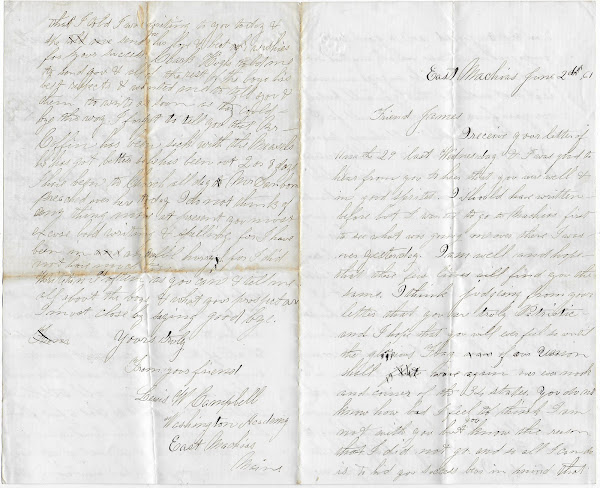 June 2, 1861 letter from Lewis W. Campbell (1841-1926), a student at Washington Academy in East Machias, Maine, to his friend James, serving with the 6th Maine Infantry in the Civil War.
June 2, 1861 letter from Lewis W. Campbell (1841-1926), a student at Washington Academy in East Machias, Maine, to his friend James, serving with the 6th Maine Infantry in the Civil War. - James, the recipient of the letter - there were several men named James in the area who enlisted in Company C, 6th Maine Infantry
- Machias, the next town over, where I believe Lewis W. Campbell's family lived
- Isaac - is he married yet or not - could not find a record; perhaps Isaac is a middle name or he married later on
- the Captain of the 6th, looking for more men
- Washington Academy in East Machias, Maine
- Eastport, Maine - perhaps the recruits shipped out of there
- Henry Leighton - also presumably serving with the 6th - perhaps Henry Hudson Leighton (1840-1916), who enlisted into Company C, 6th Maine Infantry
- a young lady who sends her regards
- Clark Hughs - perhaps Clark Perry Hughes (1839-1862), who enlisted on 15 July 1861 into Company C, 6th Maine Infantry. He was discharged for disease in September of 1861 and died in January 1862.
- Mr. Coffin, sick with the measles
- Mr. Sanborn preached - perhaps New Hampshire native John L. Sanborn (1813-1895), Baptist clergyman, who was living in East Machias, Maine, at the time of the enumeration of the 1860 Federal Census.


